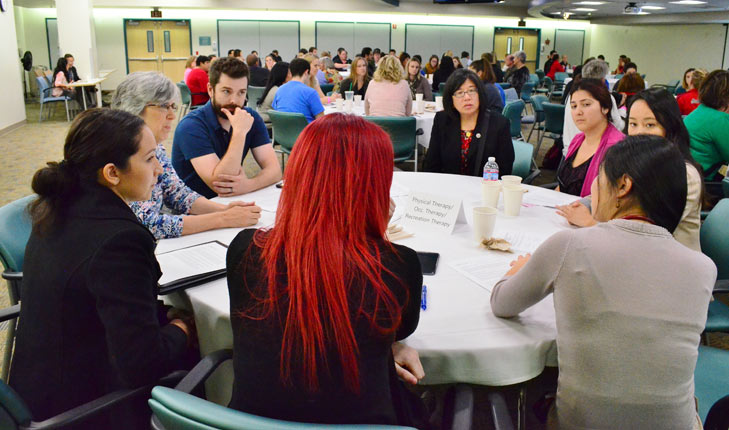Autism Spectrum Disorder affects one in 68 children in the Central Valley, and it takes a variety of health professionals to diagnose, treat and support a child on the spectrum.
The team approach to care is the focus of the second annual Interprofessional Education Workshop from noon to 2 p.m. Friday, April 8, at Valley Children’s Healthcare. The workshop is titled “Autistic Spectrum Disorder: A Family-centered Approach to Serving Children with ASD.”
The event is part of a long-standing collaboration between Fresno State’s College of Health and Human Services and Valley Children’s to foster interdisciplinary collaboration among health professionals who deliver services to children and their families in the region. It will provide learning opportunities for students at the pediatric hospital, which is one of the largest of its type in the nation.
“Interprofessional education has gained significance in the last decade to improve patient outcomes,” said Patricia Lindsey, manager of clinical education at Valley Children’s. “Prior to the interprofessional education movement, we all trained as students and as professionals in silos, learning our own field with members of our field. However, when we provide health care to our patients and families, none of us does it alone. We are a team. We work in collaboration, each bringing our own talents, expertise and strengths to care for the patient as a whole. That is the best care for our clients; improving outcomes in their treatment and recovery.”
About 100 Fresno State students and 100 licensed pediatric health care professionals from Valley Children’s, including physicians, registered nurses, social workers, occupational therapists, physical therapists and speech-language pathologists, are expected to take part in the two-hour workshop.
Participating students will encompass a variety of disciplines, including nursing, social work, physical therapy, recreation administration, audiology and speech-language pathology. Each year, 141 students from these majors complete their clinical externships and internships at Valley Children’s.
“Interprofessional education is a major benefit to our students in the College of Health and Human Services, as it provides a vital learning opportunity in effective collaborative practice with health care professionals at Valley Children’s,” said Dr. Stephen Roberts, associate professor of communicative disorders and deaf studies at Fresno State, and one of the lead coordinators of the workshop. “Research has shown that the potential benefits of interprofessional education include continuous interaction, coordinated efforts and knowledge sharing among health care professionals. Our students at Fresno State will benefit from enhanced collaboration where they learn how each professional’s contribution is valued equally as a member of a health care team.”
During the workshop, students and health professionals will work together on a case study focusing on Autism Spectrum Disorder.
“Students at Fresno State are getting some of the best education in the Valley,” Lindsey said. “Valley Children’s Healthcare professionals are not just teaching Fresno State students, they are learning from them. These students are coming in with a fresh perspective, providing a new lens for seasoned professionals. We are all learning together.”
A panel of expert speakers from Fresno State and Valley Children’s will be among the presenters speaking about their experiences of raising an autistic child.
Dr. Christine Maul, assistant professor of communicative disorders and deaf studies at Fresno State, will be among the panelists. She has conducted in-depth research on Autism Spectrum Disorder and teaches courses on the subject. Her 33-year-old son, Adam, has autism and Maul said her own experiences have shaped her teaching practice.
“It is my personal mission at Fresno State to touch the students I teach; to let them know that children with autism are children first, and their families deserve our support,” Maul said. “I am concerned with children with special needs in general, and I encourage my students to adapt a family-centered approach. By coming together in an effort to understand these challenges, we hope to better serve children with autism and their families at Valley Children’s.”
The interprofessional education model, a framework sponsored by the Interprofessional Education Collaborative, focuses on the Core Competencies for Interprofessional Collaborative Practice that prepare all health profession students to work together to build a safer and better patient-centered U.S. health care system.
“These Core Competencies will be addressed via various interactive learning activities throughout the workshop,” Roberts said. “At the end of the workshop, participants will be able to describe the diagnostic criteria of Autism Spectrum Disorder and apply techniques from the Core Competencies to increase the quality of health care experience for children.”
A team of professionals from Fresno State and Valley Children’s have been working closely on this collaborative since 2014, resulting in the first Interprofessional Education Workshop in fall 2015 that focused on ethical decision-making. The series of interactive workshops will continue in fall 2016.
For more information, contact Stephen Roberts at sroberts@csufresno.edu or 559.278.2421 or Patricia Lindsey at plindsey@valleychildrens.org or 559.353.8112. For media inquiries, contact Zara Arboleda at 559.284.0187 or zarboleda@valleychildrens.org or Melissa Tav at 559.681.9656 or mtav@csufresno.edu.
Related links:





